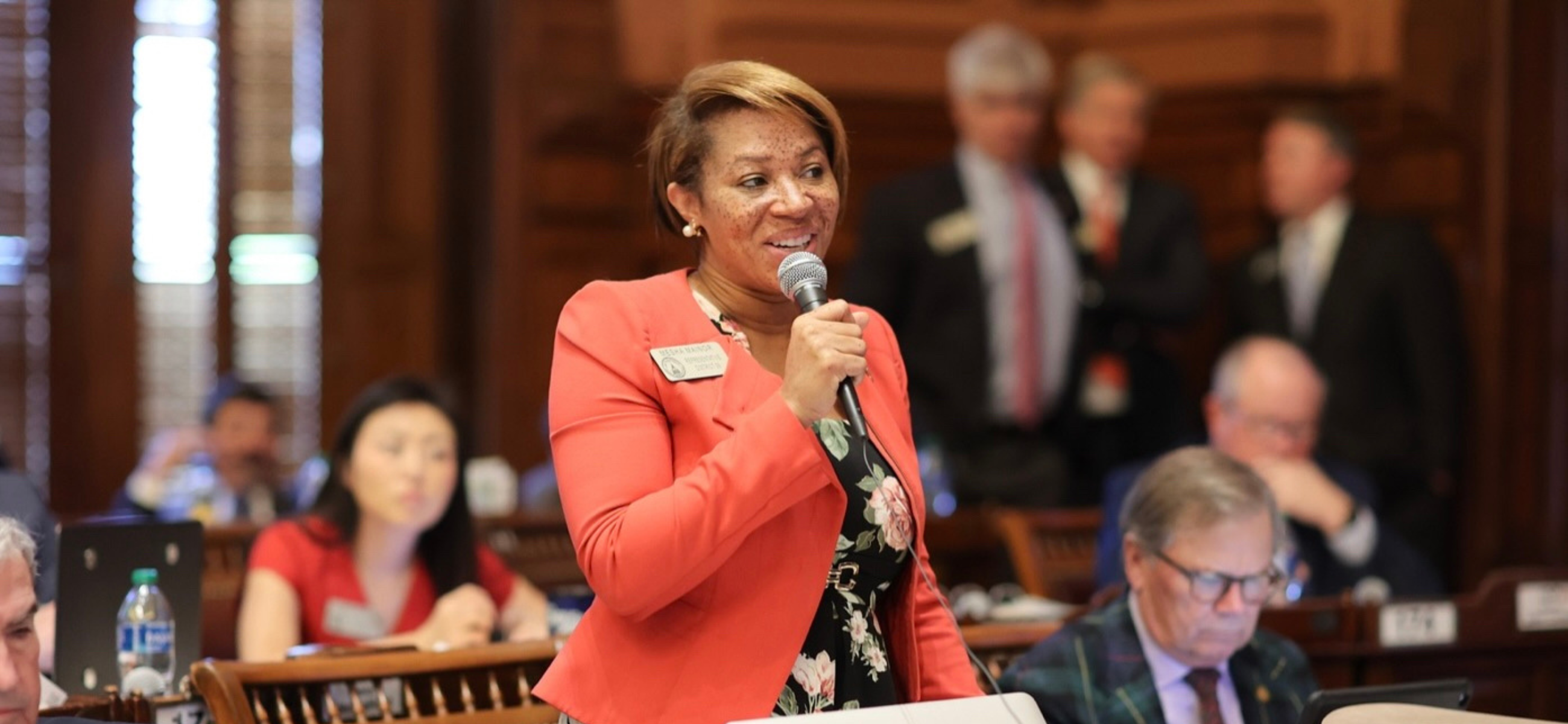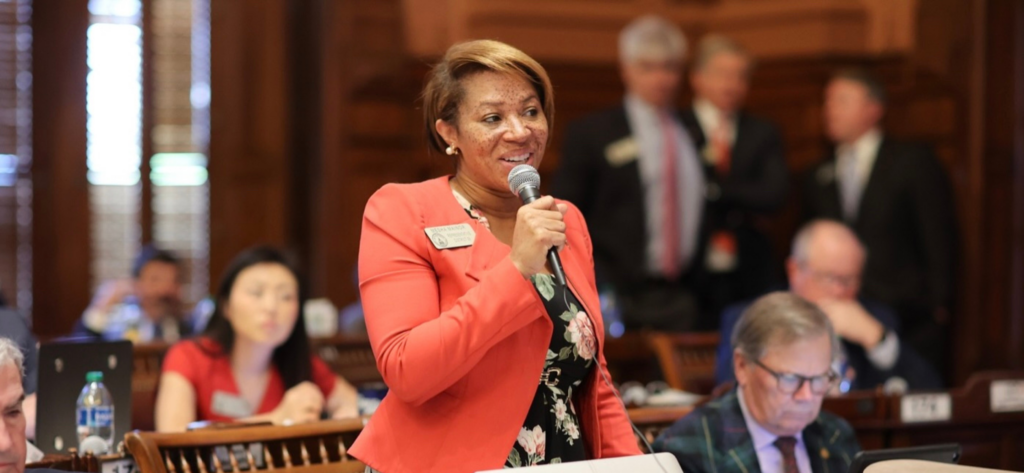Stay ahead of the curve as a political insider with deep policy analysis, daily briefings and policy-shaping tools.
Request a DemoMesha Mainor is unfazed by critics and passionate about school choice

Rep. Mesha Mainor asks a question from her seat in the House chamber during a floor debate on March 29, 2023, at the Georgia Statehouse in Atlanta. (Credit: Georgia House of Representatives)
Editor’s note: Shortly after the publication of this article, Rep. Mesha Mainor announced she was leaving the Democratic Party for the Republican Party.
Mesha Mainor, an Atlanta native, is unapologetic about her ideologies and decisions as a state legislator that have ruffled some feathers among Democrats in the Georgia General Assembly.
Mainor was elected to the Georgia House of Representatives in 2020, and she is a Democrat representing House District 56 in the heart of Atlanta. Her upbringing, she described, was in a crime-ridden area called The Bluff. But she was able to overcome a lot of challenges in her life and has worked in the health care industry for more than two decades.

The mother of two is unrelenting in her push to expand private school vouchers, which she prefers to call the “parent choice” bill. Mainor also plans to advocate for other issues during the upcoming session, like victims’ rights and greater prosecutor oversight.
“I would love for us to get the parent choice bill passed. I hate calling it a voucher,” she told State Affairs during an interview. “Voucher has a negative connotation to it, which is why they stopped doing food stamps as vouchers.”
Democrats not only in Georgia but across the nation have been largely against the push for the expansion of private school vouchers, an issue they say will harm public schools. Most Republicans think otherwise and believe that more parents should have the option to send their kids to private schools.
“If it doesn’t get passed in its current verbiage, maybe we can make it better to bring more people on board,” Mainor said of the private school voucher proposal in the state.
Meanwhile, most Georgia Democrats were relieved that efforts to expand the school voucher program failed during this year’s legislative session, but not Mainor. She was the lone Democrat who voted in favor of the measure that would grant more opportunities for children to attend private schools. As a result, she received backlash from party members. State Sen. Josh McLaurin, D-Sandy Springs, called to oust Mainor from her seat, posting a picture on Twitter of a $1,000 check to donate to a potential primary opponent.
During a nearly 20-minute conversation with State Affairs, Mainor spoke candidly about her frustrations with the Democratic party in Georgia, addressing issues related to the school bus system, how she’s endured an ongoing stalking case and more.
Q. Tell me more about your upbringing, passions and what led you to become a state legislator.
A. Well, I am a Georgia native. I went to Howard University. I grew up in an area of Atlanta called The Bluff, which one would say is crime-infested, prostitution, you know, etc. My mom sent me to school on another side of town just to get me out of the elements. And that’s partly why I’m so passionate about education and giving kids more opportunities and opportunities that might be in their communities.
I have two children. One just graduated from high school. She is headed to Boston University on a full ride (scholarship). And the other one is in middle school. I’m a Christian and I try my best to listen to what my spirit is telling me.
And when I entered into the politics space, I was listening to my spirit and when I got on the campaign trail, I said, ‘Hey, I don’t know anything about politics.’ I am here because my spirit led me here. I know I can do a good job. I’m service-oriented and the people gave me a shot without a platform. I am a physical therapist. I got my masters at Howard University. And I’ve done that for over 20 years and for the bulk of that I did home health. I have unique insight into what’s going on in people’s homes as a result of that. I worked for Congressman John Lewis when I was up at Howard at his D.C. office. And I’ve just done a host of different things. So, I think I’m a pretty well-rounded person.
Q. Besides the private school voucher bill, what are your legislative priorities for the upcoming session?
A. Well, it has become a priority of mine to focus on victim rights. So right now, the laws and the criminal justice system for victims of domestic violence, stalking, child abuse, just any kind of predatory offenses, the system really is not built to help those people. And what I have noticed is, the way the party system is set up, it seems like the Republicans may be trying to support the system and the Democrats are trying to support the defendants, which leaves victims in the middle with no one really advocating for them. There have been families at the Capitol ever since I got there, holding signs up about their loved ones that lost their children to police violence. I have started working with those groups. I worked with Chairman Stan Gunter of the (House) Judiciary Committee. He accepted an invitation to speak to them and was really just trying to figure out what we can do legislatively to give them a voice. You know, part of the reason I supported the prosecutor oversight bill was for these families.
A lot of people like to say the prosecutor oversight bill was for one DA (district attorney) in particular and it was this race thing. But no, there are Black people killing Black people. There are Black law enforcement officers killing Black families and many of these families want justice. And it has nothing to do with one particular DA. I had some legislation that I’ve had for a couple of years related to ESOL (English for Speakers of Other Languages). So, when we have students in school and English is not their native language, if there are resources out there, the resources are only in English. And so, I would like for us to make sure in school systems where the majority population is not native English speakers that they have resources in their native language.

Q. You dealt with a stalker a few years ago. Can you talk more about that and how it’s impacted you? Do lawmakers need more protection?
A. Well, you know, that’s the thing about stalking, stalkers never stop. So, it’s still ongoing. I have been to court this year about it. He has served one year. But stalkers never stop. And if you were to look up some studies from the U.S. Department of Justice, one of the things they say is the worst crime really are stalkers because they go to such dramatic and extensive links for this fixation they have; so that’s kind of where I’m at. It’s disheartening because it’s hard to get justice. I’m an elected official. I’ve done nothing trying to get special treatment. I’ve gone through the process just like everyone else. And if I can’t get justice, and I know everything that I’m supposed to do, then that means there’s a real problem. One of my big problems with that is my stalker’s attorney is a (Fulton) county commissioner, Marvin Arrington. He was his attorney. And there are jail tapes of him saying that he was going to talk to (Fulton County district attorney) Fani Willis to take care of it. That is, friends take care of friends. You’re elected to office to serve people. But people can’t get justice if they’re taking up for friends. And I think that happens a lot. That’s what’s happening most likely with some of these law enforcement officers; people just deciding not to investigate because of relationships. So, if I can fix that, I would be extremely happy. That would be the win of the year.
Q. You have received backlash from Democrats for supporting private school vouchers. How has this impacted your relationship with other Democrats? And do you want to see any changes within your party?
A. I’m sure you have seen that my colleagues have put up checks for people to run against me, putting up checks to run against me because I support school choice. Is it that serious that I want to help someone in a marginalized community where you wanna get me out? I voted for the prosecutor oversight bill. I have valid reasons why I support the prosecutor oversight bill. Is that a reason to not want me to be your colleague? I supported not to defund the police. I represent the westside of Atlanta and midtown where crime is rampant. None of my constituents wanted to defund the police. Now do myself and my constituents feel like there needs to be more resources for human services and social services? Absolutely, but we don’t want to give law enforcement a reason to not show up at our door when we need them. And so those three votes have caused a lot of unhappy and unpleasant feelings for me within the Democratic Caucus. And they’ve made some hard lines. This is what they believe in. If I don’t believe in this, then I need to get out of the party. And so, I can’t change the Democrats’ values. And I see them continuing to be inflexible. I see them continuing to be intolerant to other ideologies. And those are things I have no control over. All I can do is continue to represent my constituents.
I’ll give you a little background knowledge on something. The Democratic Caucus did polls of all Georgia voters that are Democrats. It was strategic. And the question was, do you support vouchers, or parent choice/school choice? And the majority of Democrat voters said yes. So even with that knowledge, they still don’t want to support it. And it’s a reason they don’t wanna support it. It’s because there are lobbying groups that don’t want them to support it. So, it really makes no sense whatsoever.
Q. You serve on the House Education Committee. Can you talk about issues related to the school bus system?
A. So, I do know that we’re pushing for some environmental changes. And so electric buses are one of the proponents that we’re looking at. But my children went to public schools. When you look at the efficiency and I’m just talking as a parent, when you look at the efficiency of bus routes, there are times when there may be only two people on a bus. And in other situations, literally, there are children sitting on other children’s laps, which is a problem. And so, I don’t think any parent wants their child sitting on anybody’s lap, period. We’re in an age where that can just lead to too many other things, to be sitting on people’s laps. So I think those are things we need to address: efficiency and looking at some environmental changes. Now some things that did happen on the education committee, especially we talked about this for rural Georgians. If you only have two people riding a bus, do you actually need a school bus? And so, legislation was passed that says now you do not have to use a quote-unquote school bus. You can use other forms of transportation as long as the parents know the transportation that’s being used. So that’s what’s happening with the buses. I definitely voted for that.

The Mesha mainor files
Title: State representative (D), District 56
Age: 48
Birthplace/residence: Atlanta
Education: Bachelor of Science in health sciences from Howard University and a master’s degree in physical therapy from Howard University. She is currently finishing her Ph.D. in business administration from Northcentral University.
Career: Mainor has been a physical therapist for over 20 years, primarily working in home health care.
Hobbies: Hiking, boating, research, spending time with family, and exploring new restaurants.
Family: Mainor has two children; one in middle school, and the other is headed to college.
Issac Morgan is newsletter editor for State Affairs. He can be reached at [email protected] and on Twitter @IssacMorgan12.
Twitter @STATEAFFAIRSGA
Instagram @STATEAFFAIRSGA
Facebook @STATEAFFAIRSUS
LinkedIn @STATEAFFAIRS
Professionals still face licensing delays amid state’s transition to online system
The Gist Georgia’s professionals and business owners are still struggling to obtain professional licenses in a timely manner. As the Secretary of State’s Office rolls out its new Georgia Online Application Licensing System to expedite the process, the efficiency of this new process is being put to the test. What’s Happening Thursday morning at the …
Controversy over AP African American Studies class grows
Rashad Brown has been teaching Advanced Placement African American Studies at Atlanta’s Maynard Jackson High School for three years. He’ll continue to do so — even though the state’s top education official removed it from the list of state-funded course offerings for the upcoming school year. While Brown prepares to start teaching his class on …
Students, teachers, lawmakers blast decision to end AP African American history classes
ATLANTA — A coalition of lawmakers, civil rights leaders, clergy, educators and students Wednesday called on the state’s education czar to rescind his decision to drop an advanced placement African American studies class from the state’s curriculum for the upcoming school year. “This decision is the latest attack in a long-running GOP assault on Georgia’s …
Kamala Harris’ presidential bid reinvigorates Georgia Democrats
Georgia Democrats have gained new momentum heading into the November election, propelled by President Joe Biden’s decision to bow out of his reelection bid and hand the reins to Vice President Kamala Harris. The historic decision, announced Sunday, is expected to prove pivotal in the national and state political arenas and breathe new life and …




